WHO delivers surgical supplies to meet the needs in the occupied Palestinian territory
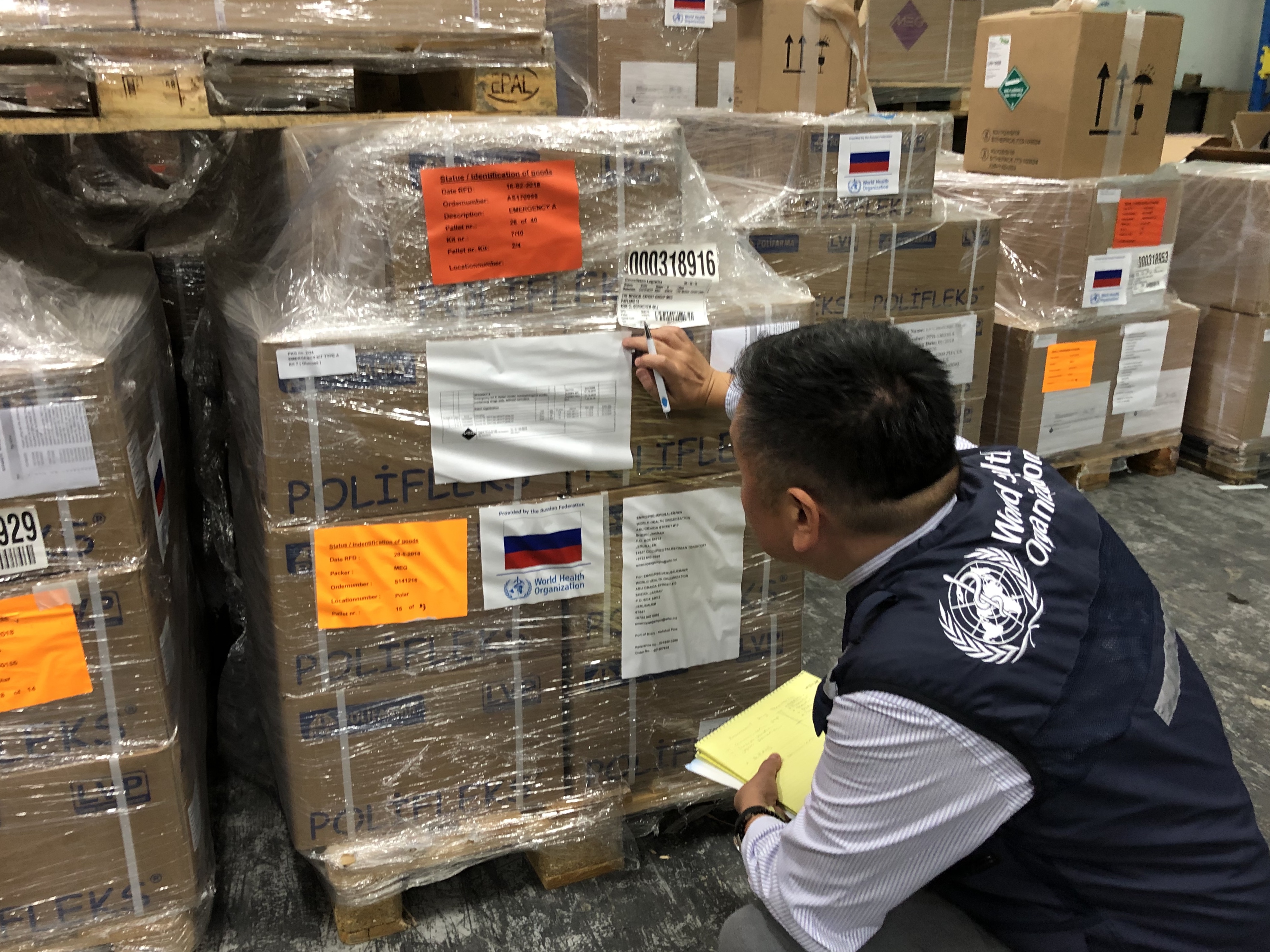 WHO delivers trauma and surgical kits to the Palestinian Ministry of Health. Credit: WHO 14 December 2018 - The World Health Organization (WHO) delivered 10 trauma and five surgical kits to the Palestinian Ministry of Health sufficient to provide up to 2000 surgical interventions. The donation was possible thanks to financial support from the Russian Federation.
WHO delivers trauma and surgical kits to the Palestinian Ministry of Health. Credit: WHO 14 December 2018 - The World Health Organization (WHO) delivered 10 trauma and five surgical kits to the Palestinian Ministry of Health sufficient to provide up to 2000 surgical interventions. The donation was possible thanks to financial support from the Russian Federation.
The Ministry of Health dispatched the trauma kits to the Gaza Strip where the massive number of injured patients is overwhelming an already overburdened health system.
“The Russian Federation has been providing continuous humanitarian support to the occupied Palestinian territory. The donation of the trauma supplies to WHO is necessitated by the mass influx of casualties in the Gaza Strip,” said Mr Aydar Aganin, Head of the Office of the Russian Federation Representation to the Palestinian National Authority.
Since 30 March, over 250 Palestinians were killed and over 25 000 injured during demonstrations along the fence with Israel. Around half of them received needed health care at the trauma stabilization points supported by WHO and discharged. Still, over 13 000 were transferred to Ministry of Health and nongovernmental organization hospitals for treatment. Often, treatment is postponed due to a lack of medicines and medical equipment. Many required interventions are not short term. At least 700 patients with complex gunshot injuries will require long term limb reconstruction with multiple surgeries and extensive rehabilitation for up to two years.
“Shortages of medicines and medical equipment are a daily reality in Gaza. WHO and humanitarian health partners are struggling to fill chronic gaps of essential medical supplies. We are grateful to the Russian Federation for their generous contribution that will help to address health needs of patients requiring surgery”, said Dr Gerald Rockenschaub, Head of the WHO Office for the West Bank and Gaza.
In October, the Central Drug Store of the Ministry of Health in Gaza reported 47% of essential medicines and 30% of essential medical disposables had less than a month’s supply remaining, with 44% of essential medicines completely depleted.
In the occupied Palestinian territory, WHO and health partners support the provision of life-saving drugs and medical supplies to ensure sustainability of essential health services in the public hospitals’ emergency departments with generous donations from donors. From 30 March until 31 December 2018, US$ 41.5 million is required by humanitarian health partners to respond to the acute health needs in Gaza; 70% was received, leaving a gap of US$ 13 million.
Read our story on trauma needs in Gaza: Gaza: Waiting for treatment
Promoting mental health and well-being among students in the West Bank
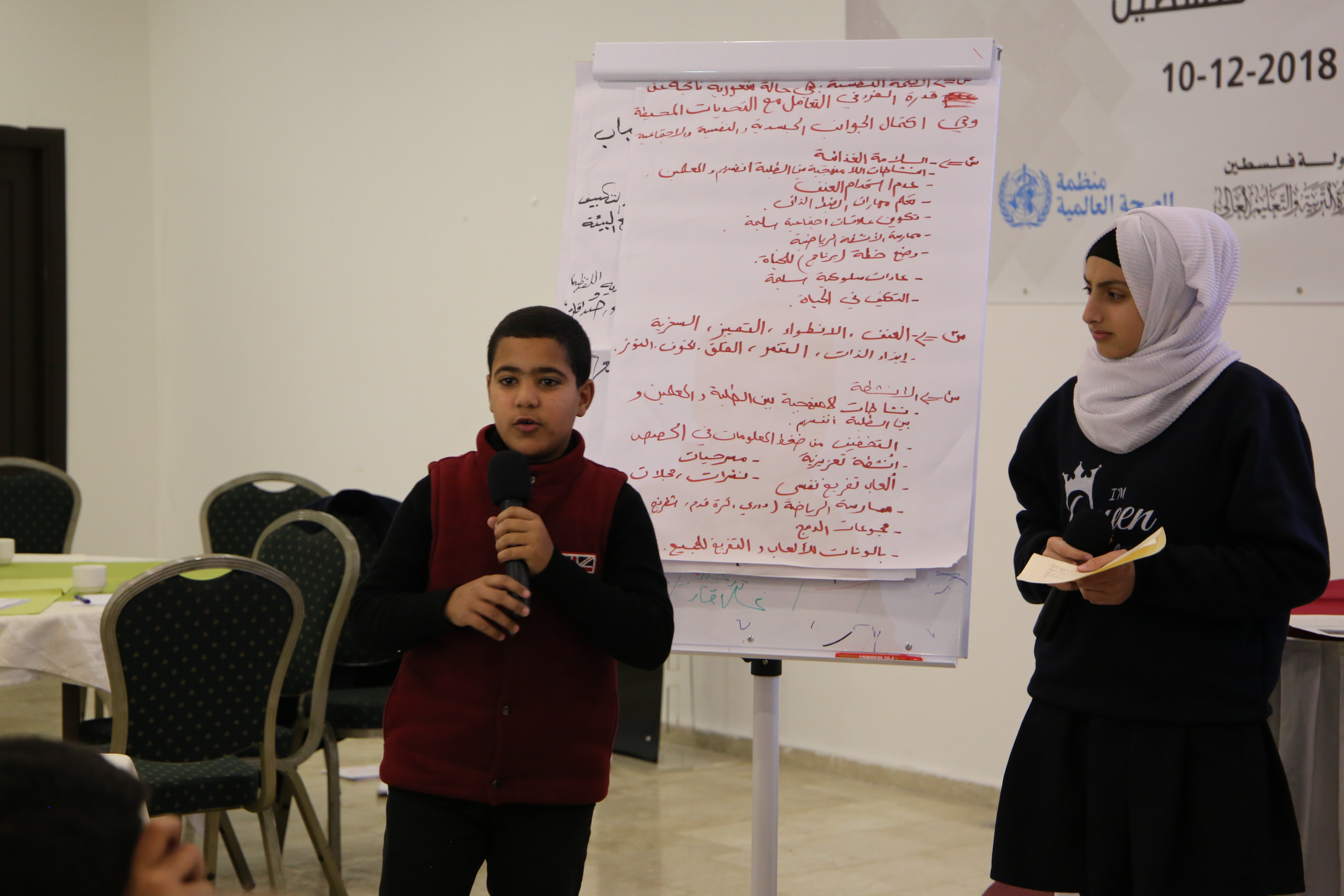 Students are discussing ways to raise awareness about mental health at schools. Credit: WHO12 December 2018 – the World Health Organization (WHO) in cooperation with the Palestinian Ministry of Health and the Ministry of Higher Education is conducting workshops in 34 schools across the West Bank in December to support students in raising awareness about mental health among their peers.
Students are discussing ways to raise awareness about mental health at schools. Credit: WHO12 December 2018 – the World Health Organization (WHO) in cooperation with the Palestinian Ministry of Health and the Ministry of Higher Education is conducting workshops in 34 schools across the West Bank in December to support students in raising awareness about mental health among their peers.
Around 100 representatives of student parliaments participated in the workshops, discussing issues they face in their schools and ways to help children and adolescents cope with everyday challenges. Together with the school counsellors they also developed and presented an awareness campaign to launch in their schools. The workshops were facilitated by specialists from the Ministry of Health mental health centres. These activities are linked to the WHO global awareness campaign that focuses on young people and mental health in a changing world.
Half of all mental illness begins by the age of 14, but most cases go undetected and untreated. Fortunately, much can be done to help build mental resilience from an early age to help prevent mental distress and illness among adolescents and young adults, and to manage and recover from mental illness. Prevention begins with being aware of and understanding the early warning signs and symptoms of mental illness.
The workshops are part of the "Building Palestinian resilience: Improving psychosocial and mental health responses to emergency situations" WHO project funded by the European Union. The project addresses critical gaps in the development of mental health services in the occupied Palestinian territory, particularly concerning the mental health emergency response.
Gaza: Waiting for treatment
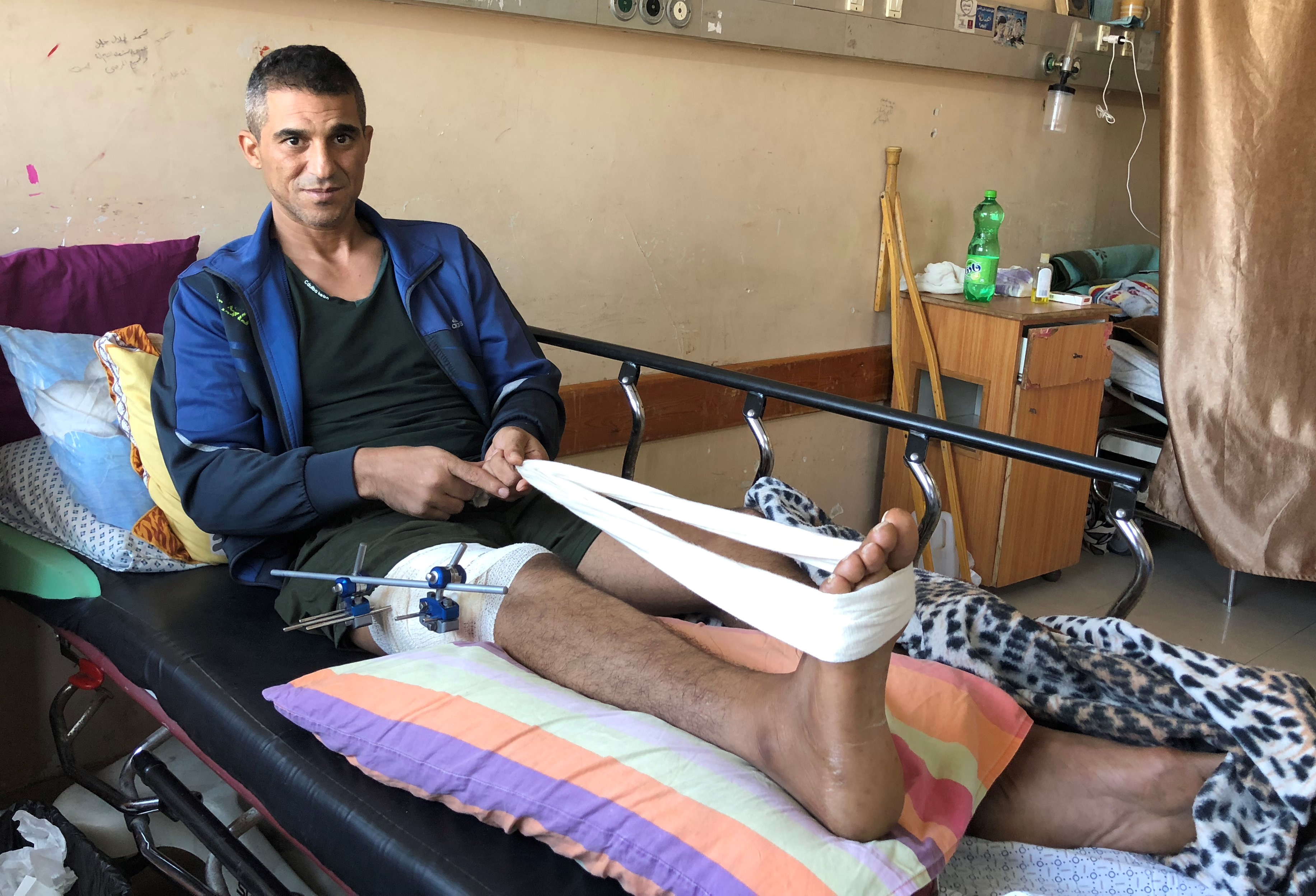 21 November 2018 – Rami, 40, sits in the hospital bed stretching his right leg with a piece of white fabric to avoid stiffness in the joints. He cannot walk. He has a severely comminuted right femur fracture caused by the gunshot injury he received in October, during the mass demonstrations in the Gaza Strip. Rami’s leg is temporarily stabilized with an external fixator. But to stimulate bone growth and avoid long-term disability he needs a circular frame that is currently unavailable in Gaza.
21 November 2018 – Rami, 40, sits in the hospital bed stretching his right leg with a piece of white fabric to avoid stiffness in the joints. He cannot walk. He has a severely comminuted right femur fracture caused by the gunshot injury he received in October, during the mass demonstrations in the Gaza Strip. Rami’s leg is temporarily stabilized with an external fixator. But to stimulate bone growth and avoid long-term disability he needs a circular frame that is currently unavailable in Gaza.
Due to the chronic shortage of medicines and medical equipment, even the largest Gaza hospital, Shifa, cannot provide Rami and many other patients with much-needed health services.
Since 30 March 2018, over 24 000 Palestinians have been injured in Gaza during the Great March of Return demonstrations. The mass influx of casualties has disrupted an already fragile health system. In the hospitals, trauma patients are prematurely discharged to make room for new patients.
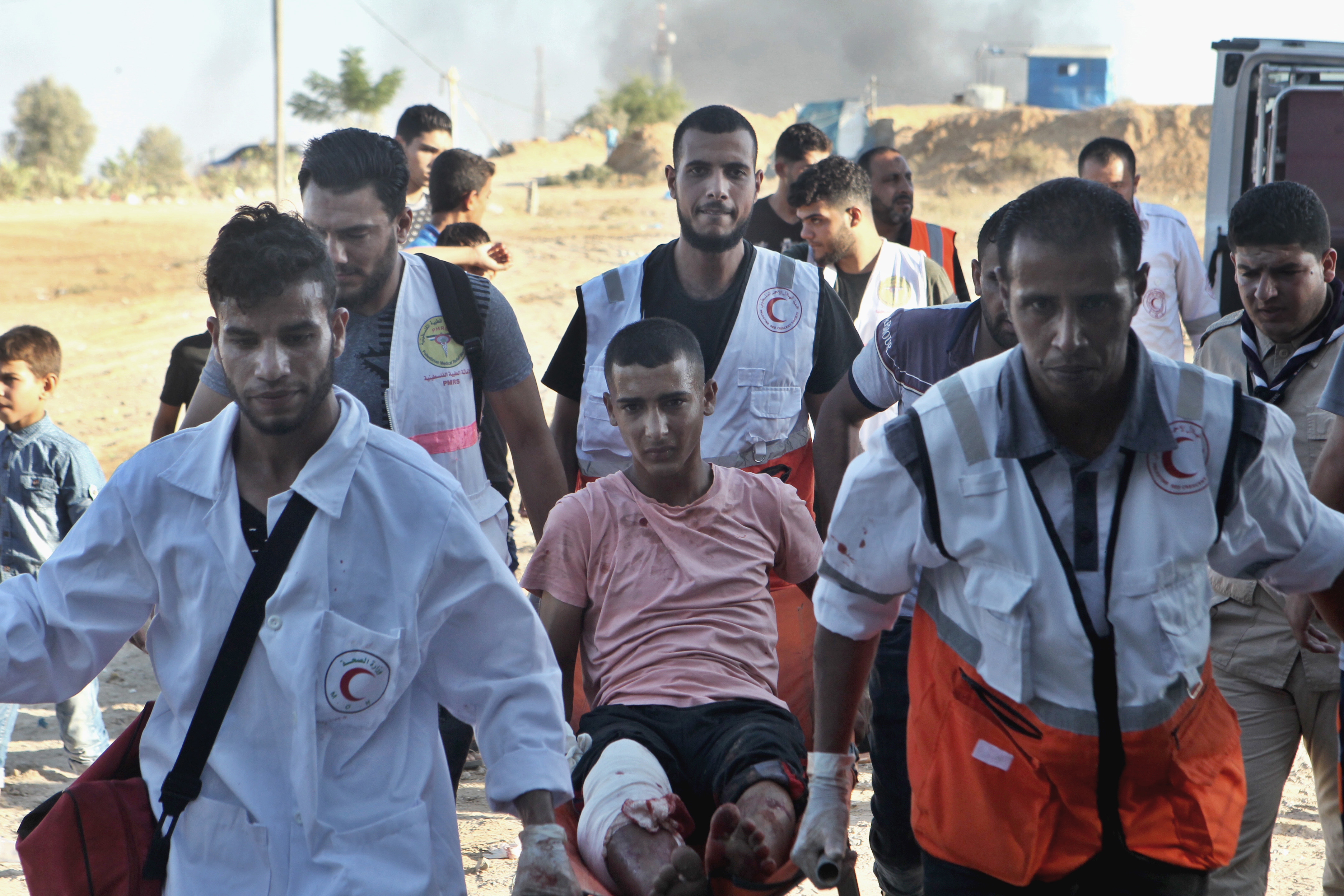 The Ministry of Health and Palestinian Red Crescent Society’s 10 trauma stabilization points (TSPs), supported by WHO, have helped to substantially reduce the burden on the overloaded hospitals. At the TSPs, set up throughout critical zones in Gaza, wounded patients receive life-saving care close to the point of injury. Almost 50% of the injured patients are treated at the TSPs and immediately discharged.
The Ministry of Health and Palestinian Red Crescent Society’s 10 trauma stabilization points (TSPs), supported by WHO, have helped to substantially reduce the burden on the overloaded hospitals. At the TSPs, set up throughout critical zones in Gaza, wounded patients receive life-saving care close to the point of injury. Almost 50% of the injured patients are treated at the TSPs and immediately discharged.
Still, since the end of March, over 12 000 injured patients have been transferred for treatment to hospital. Initial screening found that at least 460 Palestinians will need long-term limb reconstruction, which requires up to seven surgeries and extensive rehabilitation for up to two years. As the screening continues, this number is expected to grow.
Confined to bed, Rami has been waiting for treatment for over a month now. A father of six, he is almost crying: “My leg is not fixed well, and I can feel it’s moving. I need a proper fixator for my leg to heal. If I am disabled, I won’t be able to support my family.”
“If we do not receive a circular external fixator for Rami as soon as possible we will offer him a referral for treatment outside Gaza,” says Dr Mahmoud Matar, an orthopedic surgeon at Shifa hospital. But to receive health care abroad, Palestinians must apply for Israeli security permits. The approval rate for those injured in demonstrations near the fence is significantly lower than the overall approval rate. Only eight out of 52 applications were approved in October.
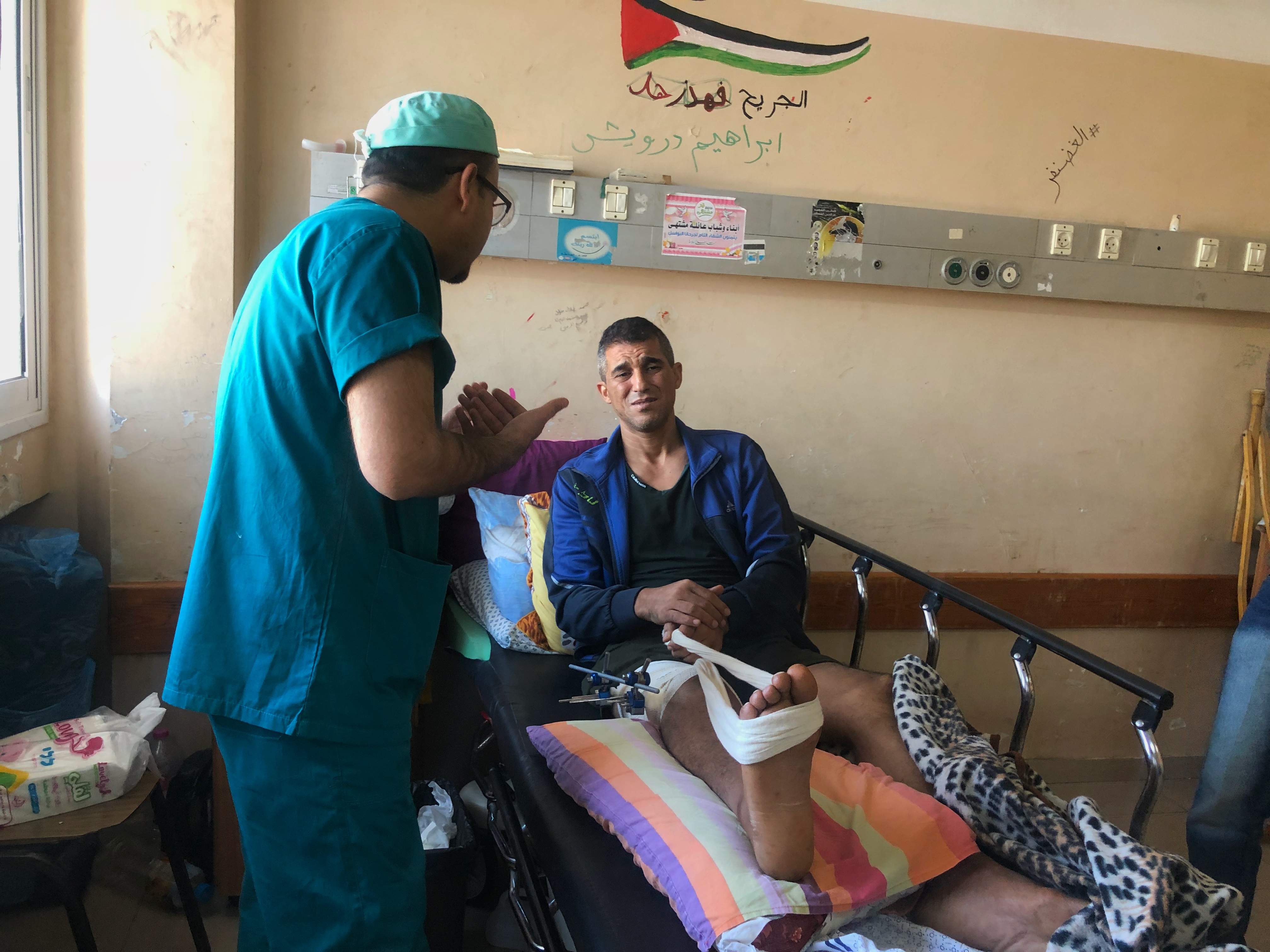 Another option for Rami is to go undergo complex surgery in Gaza, but that might result in deformity, limping and persistent pain.
Another option for Rami is to go undergo complex surgery in Gaza, but that might result in deformity, limping and persistent pain.
“Do you know what is the hardest feeling is for me as a doctor?” Dr Matar says. “To be unable to serve the patients. It is an internal disaster. Every time I can’t provide needed care for my patients, I feel like a criminal.”
With generous support from donors, WHO and its partners are procuring life-saving medicine, medical equipment and disposables for the hospitals in Gaza. Still, the needs are growing and the response takes time and resources. To date, there is a gap of US$ 20.8 million to cover emergency health needs in Gaza until the end of the year.
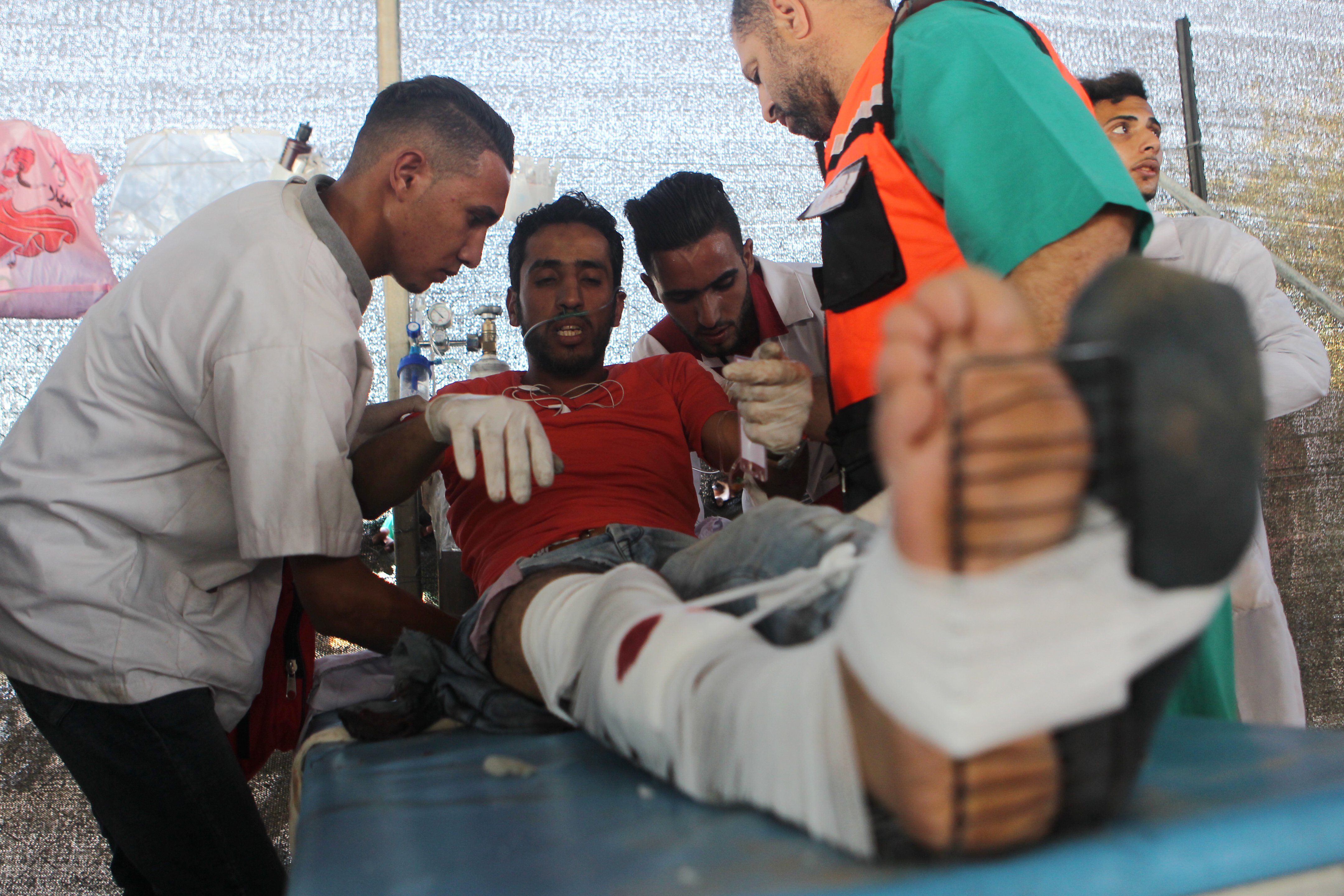 WHO’s emergency health support for trauma management in the occupied Palestinian territory is funded by generous donations from the European Union, the UN Central Emergency Response Fund and oPt Humanitarian Pool Fund. In 2018, WHO and its health cluster partners require US$ 43.8 million to support health needs in Gaza, of which approximately 53% is currently funded.
WHO’s emergency health support for trauma management in the occupied Palestinian territory is funded by generous donations from the European Union, the UN Central Emergency Response Fund and oPt Humanitarian Pool Fund. In 2018, WHO and its health cluster partners require US$ 43.8 million to support health needs in Gaza, of which approximately 53% is currently funded.
WHO Special sitiuation report, Gaza, occupied Palestinian territory, 7–20 October 2018
 A paramedic evacuating an injured child from field. Credit: PRCS.9 Palestinians were killed and 1306 were injuredby Israeli forces during the reporting period from the 7 to the 20 October, according to the Ministry of Health.
A paramedic evacuating an injured child from field. Credit: PRCS.9 Palestinians were killed and 1306 were injuredby Israeli forces during the reporting period from the 7 to the 20 October, according to the Ministry of Health.
Eight Palestinians, including one child, were killed during the demonstrations, while the ninth was killed due to an Israeli attack, which took place on 7 October.
Out of the total 1306 injured, 62% (815 people) transferred to Ministry of Health hospitals or NGO health facilities, including 168 children and 35 females. The remaining 38% (491) were treated and discharged directly from the trauma stabilization points.
Out of the total 815 injured people referred to a hospital, 16 were critically life threatening (1%), 299 moderate (23%), 470 mild (36%), and the remaining 30 were unspecified cases due to limited data collection.
Since the starts of the mass demonstrations, a total of 23 573 people have been injured, of which 5652 were live ammunition gunshot injuries (23%).
Full report:
WHO Special sitiuation report, Gaza, occupied Palestinian territory, 7–20 October 2018








